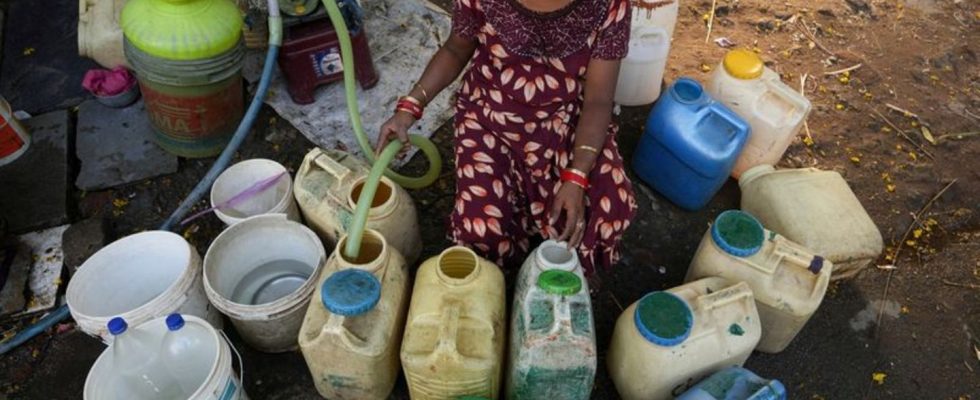World Water Day
Joint water management can bring peace
Access to clean drinking water is not a given in many areas of the world. The climate crisis further exacerbates the problem. photo
© Mahesh Kumar A./AP/dpa
With climate change, tensions over the use of transboundary freshwater resources are rising. The German head of the UN Water Convention says what needs to be done.
Conflicts over drinking water resources are increasing worldwide, which is why the United Nations is addressing this year’s motto World Water Day (March 22nd) also includes an appeal to societies and neighboring countries: “Water for Peace”. “Due to climate change, among other things, there is increasing water shortage, more conflicts and there is a risk that there could be wars over water in the future,” says Sonja Köppel, head of the Secretariat of the UN Water Convention, to the German Press Agency.
The 1992 convention helps neighboring countries that share water resources create common management structures to prevent conflict. According to Köppel, it is currently experiencing a boom: The convention was originally designed for the Europe and Central Asia region, but has been open to countries all over the world since 2016. Since then, the number of members has increased from 41 to 52. Another 30 countries are in the process of joining.
Water resources are often shared
“We have seen over the past years and even centuries that shared water management has played a role as a peacemaker,” she says. For example in the former Yugoslavia: The neighbors of the Sava River – Slovenia, Croatia, Bosnia-Herzegovina and Serbia – concluded an international agreement shortly after the end of the war in 2002, which included, among other things, the exchange of data on water quality and – quantity went. This has led to further cooperation, for example in the area of environmental protection. “This contributed to the pacification of the region.”
There was also closer cooperation on the management of shared rivers between Ukraine and Moldova and between Kazakhstan and Kyrgyzstan. Belarus and Lithuania also managed to develop a protocol on the management of a common river through initial technical cooperation. However, this agreement is currently on hold due to the political situation.
International solutions are needed
153 countries worldwide share water resources with neighboring countries. Only 24 have so far made agreements with neighboring countries on all rivers and lakes in their territory. This includes Germany.
The convention is called “Convention for the Protection and Use of Transboundary Watercourses and International Lakes”. It is based in the United Nations Economic Commission for Europe (UNECE) in Geneva and helps member countries with expertise on joint agreements or adaptation to climate change. It also offers mediators who help countries resolve conflicts in the event of a dispute.
UNESCO: Water scarcity can threaten peace worldwide
According to the UN cultural organization Unesco, increasing water scarcity can fuel conflicts around the world. “If we want to maintain peace, we must act quickly not only to protect water resources, but also to strengthen regional and global cooperation in this area,” said UNESCO Director-General Audrey Azoulay on the occasion of the publication annual water report of the organization.
Accordingly, around half of the world’s population currently suffers from severe water shortages, at least seasonally. More than two billion people live without access to safe drinking water and 3.5 billion people cannot use clean sanitary facilities. According to a UN goal, these grievances should be eliminated by 2030 – but this is unlikely to be achieved.
Most of the water required for agriculture
According to the information, global freshwater consumption is increasing by one percent annually. The reason for this is, for example, changes in diet, it was said. Even though almost 70 percent of the fresh water taken from the natural cycle goes to agriculture, industry (20 percent) and households (10 percent) are primarily responsible for the increase in water demand.
According to UNESCO, this water shortage has the potential to fuel conflict. For example, the drainage of wetlands in the Sahel region of Africa – for example through ill-conceived water development projects – has led to disputes over access to water and fertile land. UNESCO therefore recommends more cooperation on transboundary water use.
The United Nations World Water Report is prepared annually by UNESCO and its World Water Assessment Program for UN-Water.

